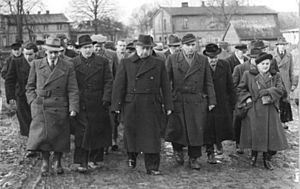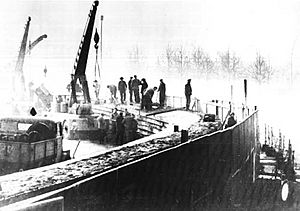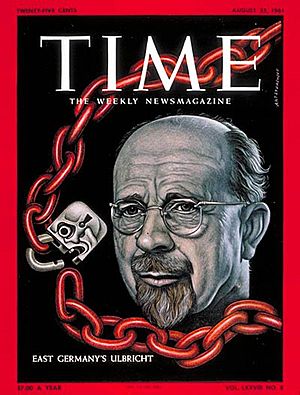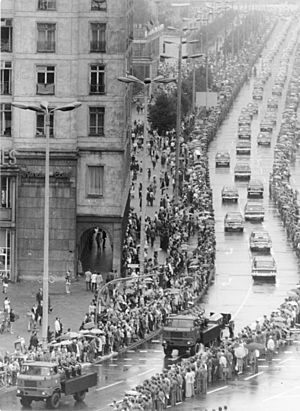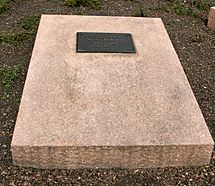Walter Ulbricht facts for kids
Quick facts for kids
Walter Ulbricht
|
|
|---|---|
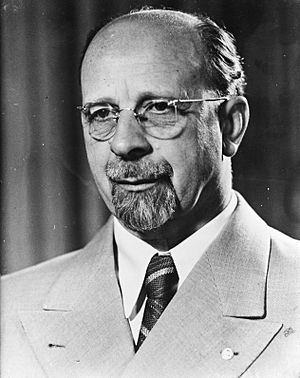
Ulbricht in 1960
|
|
| First Secretary of the Socialist Unity Party of Germany | |
| In office 25 July 1950 – 3 May 1971 (Honorary Chairman from 3 May 1971) |
|
| Preceded by | Wilhelm Pieck and Otto Grotewohl (as Joint Chairmen) |
| Succeeded by | Erich Honecker |
| Chairman of the State Council | |
| In office 12 September 1960 – 1 August 1973 |
|
| Preceded by | Wilhelm Pieck as State President |
| Succeeded by | Willi Stoph |
| Chairman of the National Defence Council | |
| In office 10 February 1960 – 3 May 1971 |
|
| Preceded by | Office established |
| Succeeded by | Erich Honecker |
| Personal details | |
| Born |
Walter Ernst Paul Ulbricht
30 June 1893 Leipzig, Kingdom of Saxony, German Empire |
| Died | 1 August 1973 (aged 80) Templin, East Germany |
| Resting place | Zentralfriedhof Friedrichsfelde |
| Nationality | East German |
| Political party | SED (1946–1973) |
| Other political affiliations |
SPD (1912–1917) USPD (1917–1920) KPD (1920–1946) |
| Spouses | Martha Schmellinsky (1920 – ?) Lotte Kühn (1953–1973) |
| Children | Beate Ulbricht |
| Profession | Joiner |
| Military service | |
| Allegiance | |
| Branch/service | German Army |
| Years of service | 1915–1918 |
| Rank | Gefreiter |
| Battles/wars | World War I
|
Walter Ernst Paul Ulbricht (born June 30, 1893 – died August 1, 1973) was an important German politician. He was a leader in the Communist Party of Germany (KPD) during the Weimar Republic. After World War II, he helped create and lead East Germany, officially known as the German Democratic Republic.
From 1950 to 1971, Ulbricht was the First Secretary of the Socialist Unity Party of Germany. This made him the main decision-maker in East Germany. When President Wilhelm Pieck died in 1960, Ulbricht also became the head of state until his own death in 1973. He was known for his strong leadership and for demanding the building of the Berlin Wall in 1961. This wall was built to stop people from leaving East Germany for West Germany.
Contents
Early Life and Political Beginnings
Walter Ulbricht was born in 1893 in Leipzig, a city in Saxony. His parents, Pauline and Ernst Ulbricht, were active in the Social Democratic Party of Germany (SPD). Walter joined the SPD himself in 1912. He only went to primary school and then trained to be a joiner, which is someone who builds things with wood.
World War I and German Revolution
Ulbricht served in the German Army during World War I from 1915 to 1917. He fought on the Eastern Front and in the Balkans. He was against the war from the start. In 1918, he left the army. This happened as the German Empire was collapsing.
In 1917, he joined the Independent Social Democratic Party of Germany (USPD). This party had separated from the SPD because they did not support Germany's involvement in World War I. During the German Revolution of 1918, Ulbricht became part of a soldiers' council. In 1919, he helped found the Communist Party of Germany (KPD).
Weimar Republic Years
In 1920, Ulbricht joined the KPD and quickly became an important organizer. He rose through the party ranks, joining the Central Committee in 1923. Ulbricht believed in a strong, centralized party, similar to Vladimir Lenin's ideas. He studied at the International Lenin School in Moscow in 1924 and 1925.
He became a member of the regional parliament in Saxony in 1926. From 1928 to 1933, he was a member of the Reichstag, which was the German parliament. He also led the KPD in Berlin and Brandenburg from 1929.
Before 1933, there were many street clashes between different political groups in Germany. Ulbricht became a key KPD official during this time.
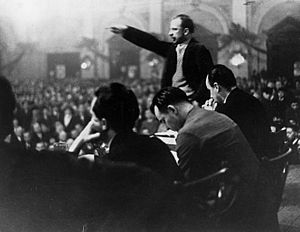
In January 1931, Ulbricht spoke at an event organized by the Nazi Party. Joseph Goebbels, a Nazi leader, also spoke. The event turned into a debate and then a fight between Nazis and Communists. Over a hundred people were injured.
Years of Exile and World War II
When the Nazi Party came to power in Germany in 1933, they began to arrest Communist and Social Democrat leaders. Ulbricht lived in exile, first in Paris and Prague from 1933 to 1937. He then moved to the Soviet Union in 1937 and stayed there until 1945.
During his time in the Soviet Union, Ulbricht was part of a group of German communists. They created propaganda in German and questioned captured German officers. In 1943, after the Battle of Stalingrad, Ulbricht and others held a Communist rally for German prisoners of war.
After World War II: Leading East Germany
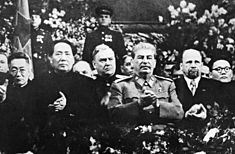
In April 1945, Ulbricht returned to Germany. He led a group of party officials to rebuild the Communist Party in the Soviet-controlled part of Germany. He wanted to create a democratic appearance but keep full control. He played a key role in forcing the Social Democrats to merge with the Communists. This created the Socialist Unity Party of Germany (SED) in 1946.
After East Germany was founded on October 7, 1949, Ulbricht became the Deputy Chairman of the Council of Ministers. In 1950, he became the General Secretary of the SED Central Committee. This position was renamed "First Secretary" in 1953. This made him the true leader of East Germany.
Holding onto Power
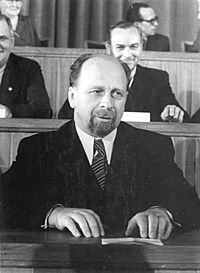
After Joseph Stalin died in 1953, Ulbricht's position as leader was uncertain. However, a protest in East Berlin in June 1953 changed things. Workers demanded economic reforms. The East German police and Soviet military forces had to stop the protests. Ulbricht was called to Moscow and received full support from the Soviet leaders. This made his position as leader of East Germany secure. Many people were unhappy and fled to West Germany. Over 360,000 people left in 1952 and early 1953.
Ulbricht had a high-pitched voice because of a childhood illness. His Saxon accent and high voice sometimes made his speeches hard to understand.
Building a Socialist Society
In 1950, Ulbricht announced a five-year plan to double industrial production. By 1952, 80% of East German industries were controlled by the state. The border between East and West Germany was closed in May 1952. The National People's Army (NVA) was created in 1956. The Stasi (MfS), a powerful secret police force, was founded in 1950. It grew quickly and was used to control the people.
Ulbricht focused on developing heavy industry, following the Soviet model. Farming was also made collective, meaning farms were run by the state. This was completed in 1960. When President Wilhelm Pieck died in 1960, the role of president was removed. Instead, a group called the State Council of East Germany became the head of state. Ulbricht was named its chairman, which was like being president.
The Berlin Wall
Despite some economic improvements, many people continued to leave East Germany. By 1961, 1.65 million people had fled to West Germany. Ulbricht was worried about this. He asked Soviet Premier Nikita Khrushchev to stop the outflow of people and solve the problem of Berlin.
Khrushchev agreed to build a wall. Ulbricht worked hard on the project, keeping it a secret. On August 13, 1961, construction began on the Berlin Wall. Just two months before, Ulbricht had said, "Nobody has the intention of building a wall." This was the first time he used the word "wall." East German soldiers and police sealed the border with West Berlin overnight. The wall made it very difficult to cross between East and West Germany.
Ulbricht also supported the invasion of Czechoslovakia by Warsaw Pact troops in 1968. This was to stop the "Prague Spring," a period of reforms. East German soldiers were ready but did not enter Czechoslovakia. This showed Ulbricht's strong loyalty to the Soviet Union.
Economic Changes and Dismissal
From 1963, Ulbricht tried to make the economy more efficient with a "New Economic System." This system allowed for more local decision-making in businesses. The goal was to improve the economy, and it had some good results. However, some within the party, especially Erich Honecker, did not like these changes. They felt Ulbricht was giving too much control to experts instead of the party.
Ulbricht also tried to protect East German culture from Western influences. He wanted to create a unique youth culture for East Germany. In 1965, he criticized Western music, like The Beatles' "Yeah, Yeah, Yeah," saying East Germany should not copy "every dirt that comes from the West."
By the late 1960s, Ulbricht became more isolated. The Berlin Wall was a public relations disaster. East Germany also faced growing economic problems. Ulbricht refused to improve relations with West Germany on Soviet terms. This angered Soviet leader Leonid Brezhnev. Brezhnev found Ulbricht's demands for more independence from Moscow difficult to accept. In 1968, East Germany's constitution was changed to formally declare it a socialist state led by the SED.
On May 3, 1971, Ulbricht was forced to resign from most of his public roles. This was officially for "health reasons." Erich Honecker replaced him as First Secretary. Ulbricht remained Chairman of the State Council, which was the head of state, until his death. He also received the honorary title of Chairman of the SED. Ulbricht died on August 1, 1973, after suffering a stroke. He was given a state funeral and buried in Berlin.
Legacy
Walter Ulbricht remained loyal to Communist ideas throughout his life. He was known for being inflexible and not very popular. He was often described as a "Stalinist bureaucrat." However, he was good at strategy and managed to overcome many difficult situations.
While he brought some stability to East Germany and improved the economy, he never managed to raise the standard of living to match West Germany. Nikita Khrushchev noted that there was a clear difference in living conditions between East and West Germany.
Personal Life
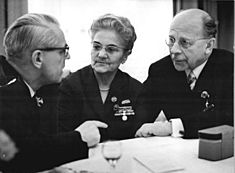
Ulbricht lived in Pankow, East Berlin. He was married twice. His first marriage was in 1920 to Martha Schmellinsky. They had a daughter. From 1953 until his death, he was married to Lotte Ulbricht. They had been together since 1935. They adopted a daughter named Beate Ulbricht, who was born in 1944.
Awards and Honors
In 1956, Ulbricht received the Hans Beimler Medal. This award was for veterans of the Spanish Civil War. He was also awarded the title Hero of the Soviet Union in 1963. In 1965, when he visited Egypt, he received the Great Collar of the Order of the Nile.
Images for kids
See also
 In Spanish: Walter Ulbricht para niños
In Spanish: Walter Ulbricht para niños
- New Economic System
- Lotte Ulbricht
- Wilhelm Zaisser
 | James Van Der Zee |
 | Alma Thomas |
 | Ellis Wilson |
 | Margaret Taylor-Burroughs |


